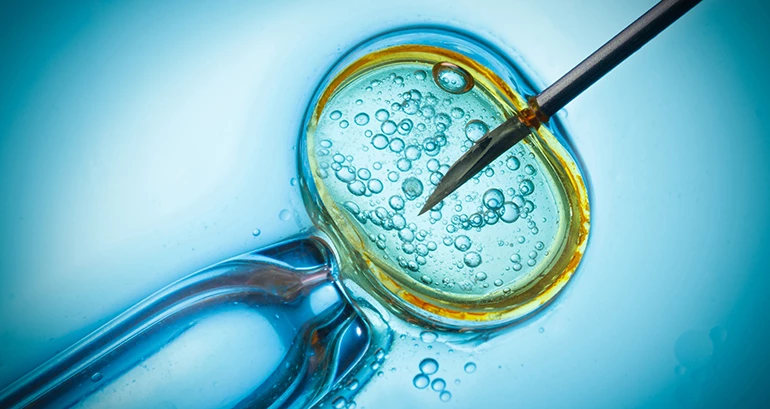Fertility Preservation Before Breast Cancer Treatment

Fertility preservation before treatment is an option for women who want to protect their ability to have genetically related children in the future. There are a number of options to consider, though each has its pros and cons.
Embryo Freezing
Involves using a woman’s own eggs and the sperm of a male partner or donor.
- Ovaries are stimulated to produce multiple eggs in a single cycle, and those eggs are harvested through an outpatient surgical procedure.
- The eggs are fertilized in the lab with sperm (“In Vitro Fertilization” or “IVF”), then frozen and stored.
- The entire process takes between two and six weeks. Doctors are sometimes concerned that stimulating a woman’s ovaries and the resulting high hormonal levels may adversely affect her chances of cancer recurrence, although evidence for this concern is lacking.
To achieve a pregnancy:
- Frozen embryos are thawed and implanted into the woman’s uterus or that of a gestational carrier (surrogate) who will carry the fetus.
- To reduce the chance of multiple births, usually no more than two embryos are implanted during any one cycle.
- There have been thousands of babies born from frozen embryos.
Since egg or embryo freezing may be timed with the start of your period, your cycle may dictate the amount of time needed for these processes. If you are having chemotherapy before surgery (neoadjuvant treatment), talk with your doctor about whether it is possible to delay treatment to complete embryo freezing.
Egg Freezing
Women who do not have a male partner or do not want to use donated sperm may choose to freeze eggs over embryos.
- Like embryo freezing, egg freezing begins by stimulating the ovaries to produce multiple eggs in a single cycle, and harvesting those eggs.
- The entire process takes between two and six weeks and may start at the beginning of a woman’s period.
To achieve a pregnancy:
- The eggs are thawed and fertilized with sperm (in vitro) and implanted into the woman’s uterus or that of a gestational carrier.
- Pregnancy rates from frozen eggs are lower than those for frozen embryos. Eggs are more difficult to freeze and thaw because they have a high water content that can form ice crystals, destroying the egg.
- However, techniques for freezing and thawing eggs have been improving rapidly. More than 2,000 babies have been born from the use of frozen eggs.
Ovarian Tissue Freezing
Ovarian tissue freezing is an experimental procedure for women who feel they do not have the time to go through a cycle of egg or embryo freezing.
- Ovarian tissue is removed in a simple surgical procedure, then frozen and stored. When a woman is ready to become pregnant, the strips will be re-implanted.
- The tissue is meant to produce hormones so eggs will begin to mature again.
- Women whose treatment includes ovarian suppression will not be able to re-implant the ovarian tissue until after that treatment is completed.
- More than 20 babies have been born from the use of frozen ovarian tissue.
Ovarian Suppression
Ovarian suppression is an experimental option that may protect your fertility while you undergo treatment.
- It is possible to shut down your ovaries during treatment with monthly shots (Zoladex or Lupron). Some women consider ovarian suppression during chemotherapy in the hope that this will preserve fertility by making the ovaries less susceptible to the harmful effects of chemotherapy.
- Recent research showed that ovarian suppression during chemotherapy improved fertility preservation and the potential for a full-term pregnancy. Ask your doctor if this is an option for you.
Learn about your options for motherhood after breast cancer treatment.
